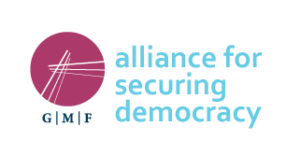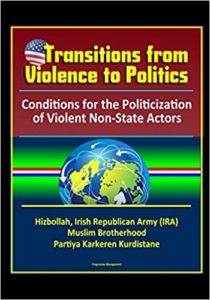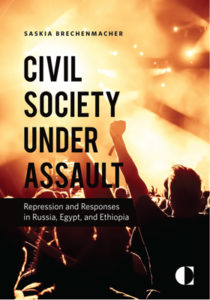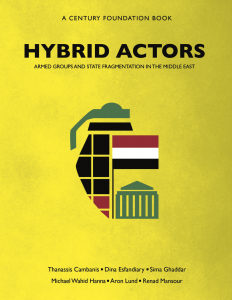 1989 marked the end not of history as such, but of a specific chapter in history. Western liberal democracy, which Francis Fukuyama predicted would enjoy eternal supremacy after 1989, now faces an increasingly serious challenge from illiberal forces, notes Javier Solana, a former EU High Representative for Foreign and Security Policy, Secretary-General of NATO, and Foreign Minister of Spain.
1989 marked the end not of history as such, but of a specific chapter in history. Western liberal democracy, which Francis Fukuyama predicted would enjoy eternal supremacy after 1989, now faces an increasingly serious challenge from illiberal forces, notes Javier Solana, a former EU High Representative for Foreign and Security Policy, Secretary-General of NATO, and Foreign Minister of Spain.
America’s period of dominance also turned out to be short-lived. The September 11, 2001, terrorist attacks against the US showed how vulnerable a great power could be to emerging non-state actors, he writes for Project Syndicate.
There are times when lesser powers or non-state actors, like well-organized terrorist organizations or criminal cartels, arise, notes analyst Dakota Wood. If sufficiently motivated and equipped, they can destabilize areas important to security, economic and diplomatic interests, she writes for the National Interest.
Mobilizing illiberal non-state actors against democratic forces is a relatively new chapter in the authoritarian playbook, observers suggest.
 In a world increasingly interconnected by technology, state and non-state actors alike are able to conduct malign interference operations of varying scales and sophistication, a recent report from the Alliance for Securing Democracy observed. The tools the Kremlin has used to wage these operations include information operations, cyberattacks, malign financial influence, support for political parties and advocacy groups, and state economic coercion.
In a world increasingly interconnected by technology, state and non-state actors alike are able to conduct malign interference operations of varying scales and sophistication, a recent report from the Alliance for Securing Democracy observed. The tools the Kremlin has used to wage these operations include information operations, cyberattacks, malign financial influence, support for political parties and advocacy groups, and state economic coercion.
The technology that is used by millions of people around the world – and exploited
by a handful of state and non-state actors – will continue to evolve rapidly, it adds.
 The international system has great difficulty in dealing with illegitimate non-state actors such as transnational terrorist groups and organized crime syndicates, notes a recent analysis. This is due to two main factors:
The international system has great difficulty in dealing with illegitimate non-state actors such as transnational terrorist groups and organized crime syndicates, notes a recent analysis. This is due to two main factors:
- the quality and quantity of influence these illegitimate actors have obtained in an era of globalization, and …
- the fact that international law considers only individual criminals and terrorists as subjects, rather than the entire illegitimate enterprise, and does not adequately link individuals, enterprises and states to more nuanced and complex forms of sponsorship of illegal activities.
Analyst Neal A. Pollard suggests tools to be embedded in the fabric of international law and agreements, to sustain credibility against illegal non-state actors and hold accountable sponsors of illegality.
Non-state actors, as well as governments and civil society groups are restricting the right of individuals to express themselves artistically, and this culture of silencing artists is continuously present in countries of both the Global North and South, PEN America and Freemuse warn.
 Both state and non-state actors are clamping down on civic activism through direct intimidation, harassment, and violence, according to a new Carnegie report. Violence is particularly common against protesters, journalists, and environmental activists. In 2018, for example, 164 environmental activists were killed defending their land from industries such as mining, agribusiness, and logging.
Both state and non-state actors are clamping down on civic activism through direct intimidation, harassment, and violence, according to a new Carnegie report. Violence is particularly common against protesters, journalists, and environmental activists. In 2018, for example, 164 environmental activists were killed defending their land from industries such as mining, agribusiness, and logging.
Chatham House (The Royal Institute of International Affairs) aims to assist local, state, and non-state actors in devising responses to malign foreign influence in Eastern Europe. It maps and analyzes levers of influence and tools of destabilization used to undermine the region’s democratic societies in an initiative funded by the National Endowment for Democracy.
 The Century Foundation (TCF) and POMEPS invite you to a conference about hybrid actors and militias that have played a central role in state decay in the Middle East and North Africa. A new report from TCF, Hybrid Actors: Armed Groups and State Fragmentation in the Middle East, supported by the Carnegie Corporation of New York, identifies the factors that make some influential armed groups persistent and successful: constituent loyalty, resilient state relationships, and coherent ideology.
The Century Foundation (TCF) and POMEPS invite you to a conference about hybrid actors and militias that have played a central role in state decay in the Middle East and North Africa. A new report from TCF, Hybrid Actors: Armed Groups and State Fragmentation in the Middle East, supported by the Carnegie Corporation of New York, identifies the factors that make some influential armed groups persistent and successful: constituent loyalty, resilient state relationships, and coherent ideology.
November 19, 2019 @ 10:00 AM – 1:00 PM RSVP
Elliott School of International Affairs, Lindner Commons, Room 602
1957 E Street NW
Washington
DC 20052







